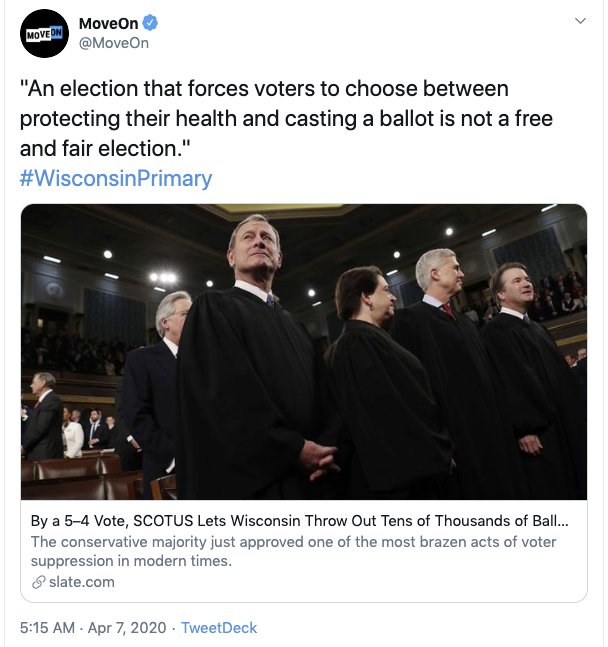SCOTUS Blocks Wisconsin Deadline Extension for Absentee Ballots

The US Supreme Court blocked an attempt to delay voting in Wisconsin's presidential primary over the coronavirus pandemic.
The 5-4 vote reversed an order that would have extended the absentee ballot deadline for voting in the Wisconsin.
Wisconsin Governor Tony Evers signed an executive order suspending in-person voting Monday after failing to convince the Wisconsin state legislature to postpone elections until May.
The Supreme Court was considering a case brought before Evers issued his executive order.
SCOTUS' decision was focused on whether to keep in place an order that extended the deadline for absentee ballots to be postmarked.
Federal Judge Had Extended Absentee Ballot Deadline
Last week, U.S. District Judge William Conley ordered the state to extend two key absentee ballot deadlines in an effort to mitigate a drop in voter turnout. Conley ruled, "Voters will have an extra day — until 5 p.m. Friday — to request absentee ballots, and, more significantly, Conley ordered election officials to count absentee ballots received by 4 p.m. on April 13, nearly a week after the original deadline of 8 p.m. on election night. Ballots do not have to be postmarked by any particular time."
SCOTUS reasoned that extending the date by which voters could mail absentee ballots “fundamentally alters the nature of the election.”
Political Fallout
Democrats and voting rights groups had gone to court to push for an extended deadline, warning that coronavirus fears could keep voters from the polls.
“The ‘electoral status quo’ already has been upended ― not by any judicial order, but by the COVID-19 pandemic and the ‘voter confusion and electoral chaos’ it is causing,” wrote Marc Elias, an attorney for the Democrats, in a brief submitted to the court.
SCOTUS' order put a heavy emphasis on the fact that the date for the ballots to be postmarked — not just received by elections officials — had been extended. And it was that remedy, the court ruled, that went beyond what Democrats had even sought.
Justice Ruth Bader Ginsburg called the majority’s decision “ill advised” in a dissent joined by Justices Sonia Sotomayor, Stephen Breyer and Elena Kagan. “While I do not doubt the good faith of my colleagues, the Court’s order, I fear, will result in massive disenfranchisement,” Ginsburg wrote. “A voter cannot deliver for postmarking a ballot she has not received. Yet tens of thousands of voters who timely requested ballots are unlikely to receive them by April 7, the Court’s postmark deadline.”
Groups like Moveon.org took to twitter slamming the decision by SCOTUS:

Vote Will Go On
Voters in the state of Wisconsin will go to the polls Tuesday. The state of Wisconsin remains under a shelter-in-place order, and federal officials have urged Americans not to gather in groups of 10 or more until the end of April.



